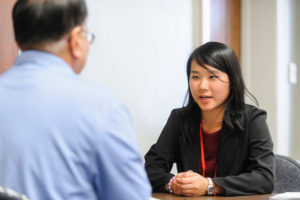Interviews are an important part of the application process for medical, PA, dental, and veterinary schools. Some PT and OT schools conduct interviews as well.
Schools conduct interviews to help them make admissions decisions. Interviews are opportunities for admissions committees to meet you in person and learn more about you. They are also your opportunity to learn about a school, its faculty, and its students.
In some cases you are asked to visit the school to do the interview. Other times schools do interviews on Zoom.
Interview formats vary from school to school. Some are traditional, one-on-one interviews similar to job interviews. Others (MMI interviews) involve a series of “behavioral scenarios” in which you tell an interviewer how you would respond in a hypothetical situation.
Most interviews include presentations on orientation and financial aid, campus tours, and the opportunity to talk with current students. Just as schools do interviews to learn more about applicants, applicants reflect on their interview experiences to decide whether a school is a good fit for them.
This is an accordion element with a series of buttons that open and close related content panels.
Prior to the Interview
- Schedule a mock interview with our office!
- Research the school. Learn about how they teach medicine and think about why that school will be a good place for you to learn. Review the schools values, the ways you match them, and why they are important to you. Learn about the city/state where the school is located and think about what attracts you to its location.
- Ask ahead of time what the format of the interview will be.
- Re-read all your application materials. Refresh your memory so you are ready to talk meaningfully about any of the activities/experiences referenced in your application.
- Take a look at some sample interview questions. This is not a comprehensive list of possible interview questions, but it will give you some idea of what interviews may look like.
- Look at feedback from students who have interviewed at the school previously on the Student Doctor Network. But remember, everyone’s interview experience is unique, so don’t plan for your interview entirely based off of others’ experiences.
- Read magazines and newspapers to be informed about current issues in the health fields. Be ready to discuss ethical or hypothetical situations.
- Come prepared with questions about the program.
- If you have in-person interviews, try to group them by geographic area to save yourself time and money. Most schools are willing to work through scheduling issues with applicants.
Day of the Interview
In-Person Interviews
- Interview days can be long and somewhat hectic, so plan ahead to make your experience as smooth as possible.
- Give yourself plenty of time to get there.
- Wear professional attire.
- Bring water, a snack, a notebook, and a pen.
- During the interview and orientation sessions, take notes on program information or responses to your questions.
Online Interviews
- Interview days can be long and somewhat hectic, so plan ahead to make your experience as smooth as possible.
- You will be on camera, so make sure to conduct your interview from a quiet, clean, well-lit space.
- Wear professional attire.
- Have water, a snack, a notebook, and a pen nearby.
- During the interview and orientation sessions, take notes on program information or responses to your questions.
During the Interview
- Greet everyone in the room individually. Wait to be asked to be seated before you sit down.
- Try to provide specific examples from your own experience. Examples show the interviewer how you know something, what your experiences are, and how you have changed.
- Think and, if necessary, pause before answering questions, especially if they catch you off guard.
- If questions have multiple parts, make sure you answer them all. Jot down notes about the questions if necessary.
- Think of each question as an opportunity to share a little more about yourself with your interviewer(s).
- Ask your own questions!
After the Interview
-
If you interviewed with one or two people, and you have their contact information, send each of them a thank you email.
-
You may also want to send thank yous to the admissions office or anyone else with whom you had significant conversations.
